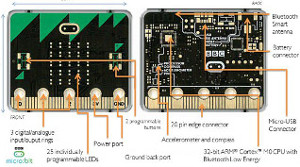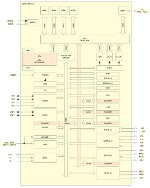Open source Micro:bit SBC aims to get UK kids coding
Mar 24, 2016 — by Eric Brown 2,191 views The BBC has begun shipping its open source “Micro:bit” — a microcontroller based IoT hacker board for UK schoolkids running ARM Mbed.
The BBC has begun shipping its open source “Micro:bit” — a microcontroller based IoT hacker board for UK schoolkids running ARM Mbed.
The BBC announced its open source, Internet of Things-focused Micro:bit hacker board for British schoolchildren a year ago, and revealed full specs in June. After some considerable delays pushing past the scheduled October debut, the COM-like SBC has now begun shipping to UK schools. Although it’s too late in the school year to be fully incorporated into the curriculum, the BBC is asking schools to give the boards away free to kids, so they can experiment on their own.


Micro:bit, front and back
(click images to enlarge)
Although built by Raspberry Pi manufacturer Element14, the 50 x 40mm board is more like an Arduino than a Raspberry Pi, another UK-birthed hacker SBC designed for computer education at British public schools. It’s being given away to 11 to 12-year old Year Seven students.

Micro:bit side view
(click image to enlarge)
Like the Arduino, the Micro:bit is built around microcontroller units (MCUs), rather than higher level ARM, MIPS, or x86 style application processors, and it doesn’t run Linux. Instead, the board runs on the ARM Mbed OS for MCUs, and development occurs on Bluetooth and micro-USB connected desktops, tablets, phones, and more advanced hacker boards like the Raspberry Pi. Available tools include Python, JavaScript, and other higher-end development environments.

Paloma Faith, Boy George, Ricky Wilson, and will.i.am promote the Micro:bit in a promotion with “The Voice” TV show
(click image to enlarge)
The BBC and its over two dozen partners, including chief investor Barclays, are building 1 million of the devices, even though they will initially be given away to just over a half million Year Sevens. Later this year, it will open source the board and launch a non-profit foundation and community to back it, no doubt modeled in part on the Raspberry Pi Foundation. The board will eventually be sold to the general public, a la the Pi.
The project updates the BBC Micro educational computer project from the early 1980s. The Micro:bit is said to be 70 times smaller and 18 times faster than the Acorn-built BBC Micro home computer consoles, which were offered to UK schools.
— ADVERTISEMENT —
The Micro:bit is equipped with a Nordic Semiconductor nRF51822 Cortex-M0 MCU with a built-in 2.4GHz Bluetooth Smart transceiver running ARM Mbed, as well as a 48MHz NXP Kinetis KL26Z Cortex-M0+ MCU. According to a typically cheeky hands-on report from The Register, the Nordic MCU executes self-contained apps in addition to controlling Bluetooth, while the Kinetis communicates with the host via USB OTG.


Micro:bit detail view (left) and Nordic nRF51822 MCU block diagram
(click images to enlarge)
The Micro:bit is further equipped with 16KB of RAM, 256KB of flash, Bluetooth LE, and a micro-USB OTG port. There’s also an accelerometer, compass, 25 programmable LED lights, and two programmable buttons.
Five digital/analog output rings are linked to a 20-pin edge connector. You can hook up crocodile clips (aka “alligator clips” on this side of the pond) to the rings to gain access to I/O including 3x PWM, up to 17x GPIOs, 6x analog, plus serial, SPI, and I2C. The board can run standalone via an external battery pack with two AAAs, or be powered via micro-USB.
The Micro:bit site already has numerous tutorials supporting the board’s web-based editor, which supports a variety of development environments. The main point of entry is a Samsung Micro:bit mobile app, which controls the device via a Bluetooth LE wireless connection. You can also use the Python Foundation’s MicroPython, as well as Microsoft’s GUI-based Block Editor and more advanced mobile TouchDevelop language, available via an Android or Windows Phone app.
Other visual programming environments include Blocks and Code Kingdom’s JavaScript program. ARM’s Mbed also supports C++ development.


Rishworth School’s Micro:bit and Raspberry Pi based space probe (left) and hooking up to the Micro:bit’s expansion connector
(click images to enlarge)
While there’s no direct Linux connection with the Micro:bit, the BBC has said that the device can be integrated with Linux hacker boards like the Raspberry Pi, which is already widely used in UK schools. Recently, students at Rishworth School in West Yorkshire sent a Pi-enabled Micro:bit space probe some 20 miles up via a helium balloon. The probe, which combined a Micro:bit with two Raspberry Pi boards and “an adorable Lego astronaut pilot,” took pictures of the Earth “and recorded a bone-chilling minimum temperature of -47.9° C,” says the BBC’s Micro:bit project.
Rumor: Samsung working on open source OS for IoT on MCUs
In addition to providing the main mobile app for Micro:bit, Samsung is reportedly getting further involved in MCU-based firmware. According to a Mar. 23 IDG News report, Samsung is working on an open source, RTOS-like operating system designed for microcontroller-based IoT. More information on the unnamed, lightweight OS, including whether it’s based on Tizen, will likely be revealed April 27 at the Samsung Developer Conference.
Samsung is aiming the Linux-based Tizen at higher-end IoT in consumer electronics, and offers a Linux-based home automation hub via its SmartThings subsidiary. It also offers a line of mostly Linux-based Artik computer-on-modules.
Further Micro:bit information
The BBC Micro:bit has begun to roll out to UK schools, but is not yet publicly available. More information may be found on the BBC’s Micro:bit project site.

Please comment here...